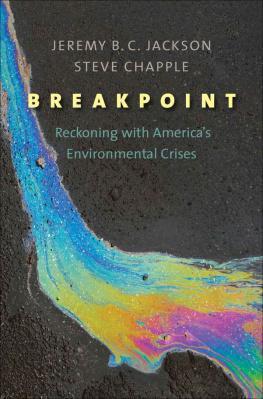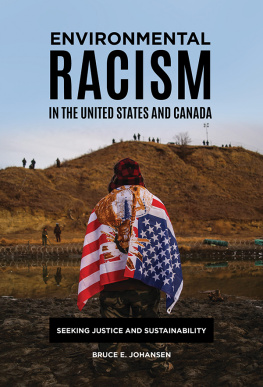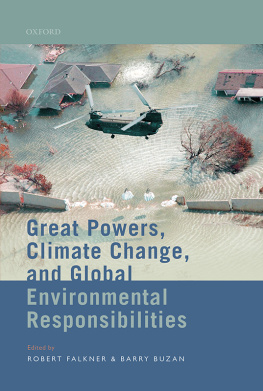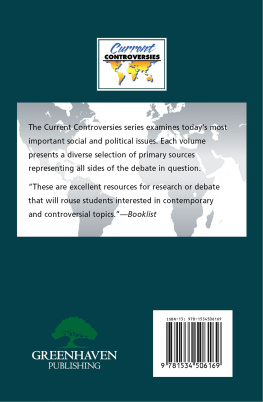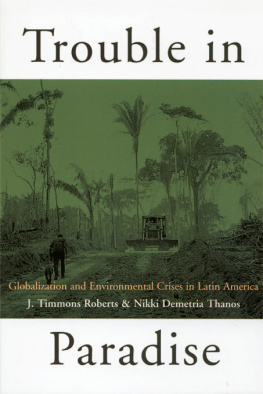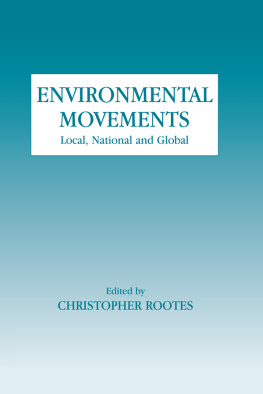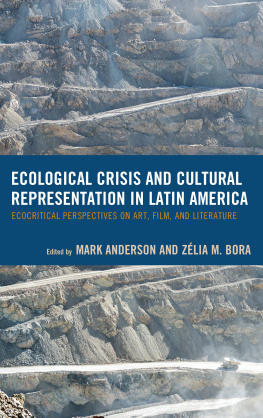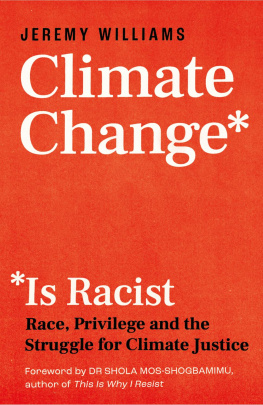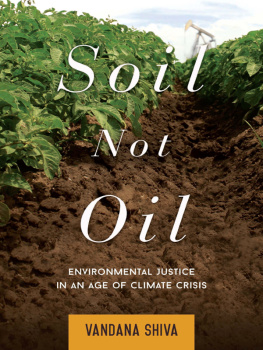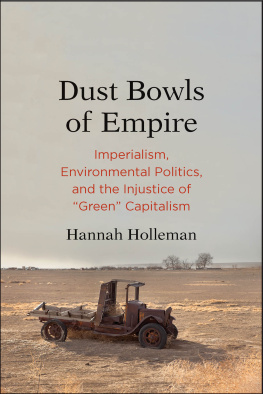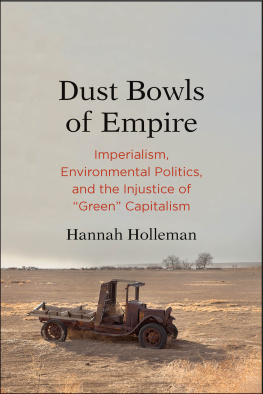
BREAKPOINT
JEREMY B. C. JACKSON AND STEVE CHAPPLE
Breakpoint
Reckoning with Americas Environmental Crises

Published with assistance from Furthermore: a program of the J. M. Kaplan Fund.

Copyright 2018 by Jeremy B. C. Jackson and Steve Chapple. All rights reserved.
This book may not be reproduced, in whole or in part, including illustrations, in any form (beyond that copying permitted by Sections 107 and 108 of the U.S. Copyright Law and except by reviewers for the public press), without written permission from the publishers.
Yale University Press books may be purchased in quantity for educational, business, or promotional use. For information, please e-mail (U.K. office).
Set in Janson type by Westchester Publishing Services, Danbury, Connecticut.
Printed in the United States of America.
Library of Congress Control Number: 2017958069
ISBN 978-0-300-17939-2 (hardcover : alk. paper)
A catalogue record for this book is available from the British Library.
This paper meets the requirements of ANSI/NISO Z39.48-1992 (Permanence of Paper).
10 9 8 7 6 5 4 3 2 1
To Cody, Jack, Julia, Rebecca, and Stephen, and
to your future in a healthier and safer world
CONTENTS
PREFACE
The ideas for this book grew out of the shockwaves following the Deepwater Horizon oil spill. We had met two years before, when Steve, a veteran journalist and adventurer with strong environmental leanings, enrolled in an interdisciplinary masters program for aspiring ocean leaders taught by Jeremy at the Scripps Institution of Oceanography. While discussing the challenges of communicating the environmental issues presented in class, we discovered that we shared similar perspectives on the world and soon became friends.
Right after the Deepwater Horizon disaster in 2010, Steve traveled to the Gulf to report on the ensuing chaos, while Jeremy, who had led the Smithsonian Institutions investigation of the consequences of another hugely destructive oil spill in Panama in 1986, fielded questions from the media about the implications of that earlier study for the Gulf of Mexico. Before long, Steve began working on the idea for a book about the oil spill and its consequences and came to Jeremy for advice. But Jeremy, an ecologist and geologist who specializes in understanding the impacts of human activities on the planet, knew that the spill was just the most recent disaster to afflict a region that has long been disrupted by human mismanagement and interference. Horrible as it was, the oil spill was a spectacular distraction from a far greater ecocatastrophe that has been building toward a breakpoint for over a century.
Serious and lasting environmental damage to the Mississippi Delta region began in the early 1900s, when the far northern headwaters of the mighty Mississippi and Missouri rivers and their tributaries in Minnesota and the Dakotas were channelized, diverted, and dammed so extensively that the river was starved of its nourishing sediment. Steves mother was from the Dakotas, and he had grown up in Montana and knew about the damming of the rivers firsthand.
A few decades later, countless tons of artificial fertilizers and pesticides derived from petroleum began to be sprayed, dumped, and injected onto and into the vast fields of the Corn Belt to sustain a remarkable agricultural revolution that was widely heralded as the miracle that would feed the world. But runoff of the residual nitrogen, phosphorus, and poisons of the new industrial agriculture began to course downstream. This toxic slurry, diverted by dams and levees, spread across the Mississippi Delta, weakening the very fabric of the vast coastal marshes that had for millennia protected the shoreline from storms.
Ultimately reaching the Gulf of Mexico, the wasted nutrients caused an explosion of microscopic algae whose rotting remains sucked up all the oxygen in some of the coastal waters off of Louisiana and east Texas, forming a dead zone as big as New Jersey that is devoid of fish and shellfish. Meanwhile, decades of dredging to construct thousands of miles of pipelines for oil and gas production, as well as widened shipping channels, hastened the death by a thousand cuts of the marshes that, at least before the horror of Katrina, had protected New Orleans from hurricanes.
As if all this werent enough, climate change caused by the same oil and gas industry that manufactures all the fertilizers and pesticides and has sliced up the Mississippi Delta is making all these problems worse. Alternating periods of extreme drought and torrential rains are strongly affecting corn and soy production, while the rise in sea level due to global warming threatens to drown large swaths of the East and Gulf coasts from Maine to Texas.
These problems are the byproduct of two of the most important and successful components of American prosperity: the petrochemical industry along the Gulf, and industrial agricultural production in the upper Mississippi Heartland. Big Agriculture produces more than a third of the corn and soy grown worldwide, as well as the grains that are consumed in countless formsfrom the meat, poultry, and processed food we eat to the ethanol in our gas tanks. But this prosperity seems increasingly hollow as the risks to the safety of our homes and health skyrocket.
Why arent we doing anything about this? One reason (or excuse) is that environmental threats are frustratingly abstract. Our eyes tend to glaze over as scientists attempt to explain the causes and consequences of a 1-, 2-, or 3-degree Fahrenheit rise in temperature over the next ten, fifty, or hundred years; and our appallingly inadequate educational programs in basic science do little to counter voters distrust of things they dont understand. But its not so abstract if youre a farmer watching your crops being destroyed again and again by increasingly persistent droughts or if you were unlucky enough to have been in New Orleans or New York City during Hurricanes Katrina or Sandy. Or in Houston, Florida, and Puerto Rico during the horrific hurricane season of 2017.
So we set out to explore the Heartland and the Gulf firsthand to talk to people, listen to their stories, and see for ourselves what was going on. We began at Lake Itasca, Minnesota, the headwaters of the Mississippi where the river trickles forth in a stream we could step over, then worked our way south through the corn and soy shag of Iowa, past the gigantic systems of locks and levees, and through Louisianas Cancer Alley where massive refineries vomit out chemical waste. Then on to Katrina-besmacked New Orleans and the once-proud Birds Foot Delta with its bountiful marshes, shrimp, oysters, wildlife, and natural gas that are sinking into the ocean at the shocking rate of a football field every day. It was a journey that few Americans living on either coast ever make, full of fun, adventure, great people, food, and music, sublime natural beauty, and nature unnaturally scarred.
Everywhere we visited seemed on the verge of a breakpoint. Midwestern corn was reaping enormous profitsalthough these have since collapsedbut the challenges of farming were increasing due to everything from pesticide-resistant superweeds to dramatic increases in extreme weather events that were destroying crops and causing catastrophic soil erosion and loss. Pollution from excess nutrients was poisoning the regions drinking water and creating dead zones in Lake Erie even more threatening than the dead zone in the Gulf of Mexico. Oil and gas were booming despite a recent drop in gas prices at the pump, and natural gas was winning the competition against coal as the major source of cleaner energy for generating electricity. But the entire Mississippi Delta seemed on the verge of disappearing beneath our feet and with it the great marshes centuries-old buffering protection for New Orleans and the entire Louisiana coast.
Next page
